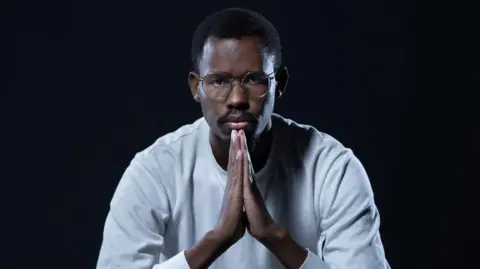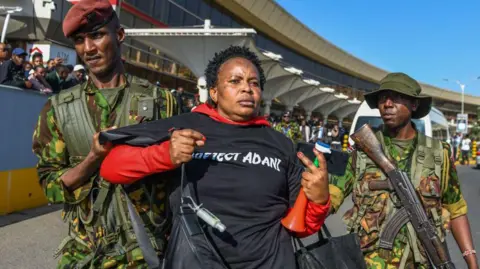 AFP
AFPNelson Amenya, a Kenyan business student, has been hailed as a hero by those campaigning for greater transparency in the deals his government makes with private companies.
Kenya's recent history is littered with stories of huge contracts resulting from corruption – and despite laws meant to prevent this from happening, some suspect it continues to happen.
Mr. Amenya, 30, who is studying in France for an MBA, disclosed details on social media in July of what he said was a proposed deal between Kenya and the Adani Group, an Indian multinational.
This was the management of Jomo Kenyatta International Airport (JKIA), the largest airport in the country and the region, which is long overdue for a complete overhaul.
“The first feeling I had [when I was passed the documents] “It was that it was just another government deal…I didn't understand the scale or the seriousness of it,” Mr Amenya, whose profile as an anti-corruption campaigner, told the BBC. was becoming more and more well known.
The documents detailed a $2bn (£1.6bn) proposal from Adani Group to lease JKIA for 30 years to modernize and operate it.
Looking through the newspapers, he estimated that if the project went ahead, it “will harm the Kenyan economy” while all the profits would go to the Indian multinational.
The deal seemed unfair to him, from what he read, in that Kenya would still contribute most of the money but would not reap the financial rewards.
Mr. Amenya had good reason to believe that these documents were authentic since “the people who gave me these documents belonged to very legitimate government ministries,” he said.
The Adani Group is involved in infrastructure, mining and energy projects globally, in countries including Israel, the United Arab Emirates, France, Tanzania, Australia and Greece. Its founder Gautam Adani is a major player in the Indian economy and a close ally of Indian Prime Minister Narendra Modi.
On further reading, Amenya said he discovered that the Adani deal with Kenya could have forced his country to pay the company if it did not recoup its investment.
“This is a serious breach of trust of the people by the leadership of the President, the Kenya Airports Authority and the minister. They have all betrayed the people,” he says.
Despite the evidence in his possession, Mr. Amenya wondered what to do next. His own safety was at risk, although he was in a better situation in France than in Kenya, where anti-corruption activists were targeted and some killed.
“I was a little scared. I didn't know what was going to happen. I'm risking my career, I'm risking my life, why should I risk doing this?” he wondered at the time.
However, in the end, he felt that remaining silent was not an option.
“You know, only cowards live long.”
After spending weeks reviewing what had been sent to him, Mr. Amenya leaked the documents on his Page X in July, immediately sparking outrage in Kenya.
JKIA airport workers went on strike to demand the agreement be scrapped.
 Getty Images
Getty Images“It was like a duty for me, for my country. Even if I am far away, I still have a duty towards my country. I want to see a better Kenya, my country of origin develop, industrialize and put end corruption.
He fears the airport deal is a harbinger of what could come.
Mr Amenya says it is not just the unusual terms and lack of transparency that have raised alarm bells, but also, he says, the fact that Kenyan laws appear to have been systematically ignored.
“[The authorities] never did due diligence on this company…they did not follow due process of procurement.
He alleges that some government officials hoped to circumvent legal requirements, including public consultation, meant to prevent taxpayers' money from being misspent.
A report released in April by the Kenya Airports Authority on the proposed deal highlighted that there were no plans to consult stakeholders on the plan.
“That was in April, and by July, when I revealed this, they had made no public participation. This deal was pretty secretive, and at that point, they were only a month away from signing of the agreement,” says Mr. Amenya.
“After I exposed this deal, they hurriedly tried to come and do some sort of fake public participation – they called Kenya Airports Authority staff and started holding meetings with stakeholders.”
Various officials and branches of state denied allegations of corruption in the process and authorities signed another multi-million dollar deal with the Adani Group – this time to build power lines.
The Adani Group said Mr Amenya's claims were baseless and malicious.
A spokesperson told the BBC that “the proposal was submitted in line with Kenyan regulations on public-private partnerships and aimed to create a world-class airport and significantly improve the Kenyan economy by creating many new jobs.” .
The Adani Group further claims that no contract was signed because “discussions did not result in a binding agreement.”
The company also claims that the proposed energy deal was beyond reproach and that the company “categorically refutes all allegations and insinuations regarding any violation of Kenyan laws in our operations or proposals.”
“Every project we undertake is governed by a strong commitment to respect, transparency and the laws of the respective countries in which we operate,” the statement said.
But it was not Mr. Amenya's flight that really changed the government's mind.
It was only when US authorities indicted Gautam Adani for his alleged involvement in a $250m (£200m) corruption scheme that Kenya took action.
Representatives of the Adani Group have denied the allegations by US prosecutors and called them “baseless”.
During a state of the nation address in Parliament last month, Kenyan President William Ruto announced the cancellation of the two Adani deals.
“Faced with undisputed evidence or credible information about corruption, I will not hesitate to take decisive action,” Ruto said in a speech greeted by loud cheers in Parliament.
Kenyans celebrated the decision which Ruto attributed to new information provided by investigative agencies and partner countries.
“I was in class when this announcement came. I couldn’t believe it,” says Mr. Amenya.
“I think for the first hour I had tears in my eyes. I was so happy.”
Even if he doesn't consider himself a hero, messages of support are pouring in from everywhere, especially from India.
Forty minutes after class ended, he posted his now famous tweet “Adios Adani!!” – goodbye Adani.
“It was momentous… Everything I did finally paid off.”
The feeling of triumph, however, came after months of personal struggle and pressure.
Shortly after revealing the airport deal, Mr Amenya was sued for defamation by an Adani Group representative and a Kenyan politician, leading him to question whether he should continue.
“Some people from the government came to see me, they were even ready to pay me, they told me: 'You have to cash in and stop this fight with the government,'” he remembers.
“Giving up would have been the biggest mistake of my life, a betrayal of the Kenyan people.”
But even after abandoning these agreements, President Ruto still wonders why Kenyans opposed this and many other projects he championed. He says he will find a way to modernize the airport.
“I saw them saying that those who stopped the modernization of our airport are heroes. Heroes? What do you gain when you stop the construction of an airport in your country?” asked Ruto at a public reception in early December.
“You have no idea how it's going to be built, and those who oppose it have never set foot in an airport, you just want to oppose it.”
Mr Amenya, who still faces defamation cases, is currently raising money to help pay his legal costs and says his future in Kenya is uncertain.
“I have received threats from credible intelligence agencies and people in Kenya who have warned me not to go back because obviously some people are very angry at what I did “, he said.
A steep price, but one that Mr. Amenya says he would happily pay again.
“We don’t really need to wait for someone to save us,” he says.
You might also be interested in:
 Getty Images/BBC
Getty Images/BBC#Nelson #Amenya #revealed #details
